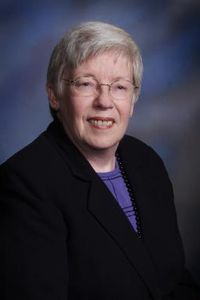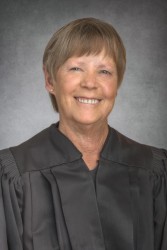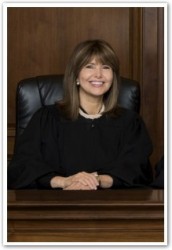In honor of Women’s History Month, we are looking back at some of the historic trailblazers who became Tennessee’s first female judges.
While young people today know only a world where female judges are a regular part of the judicial system, it was not so long ago that women on the bench were a rarity. In the State of Tennessee, at certain levels, they were not even a rarity; they were nonexistent.
The women discussed below, though, refused to curtail their ambitions to better match what was considered possible at the time. They studied, they worked hard, and they resolved to let their abilities, rather than convention, define the limits of their success.
As a result of their vision and perseverance, the Tennessee Judiciary is a changed institution. Today, women compose the majority of the Tennessee Supreme Court, a body that was all-male until 1990. Looking across the state, at the trial court level 25 percent of judges are women. Eighteen of the state’s 31 judicial districts have at least one woman judge, and eight have more than one.
While there is obviously still a long way to go to reach gender parity on the benches of the state’s courtrooms, these numbers represent a sea change from the judicial landscape as it existed deep into the 20th century. The women discussed below played a large part in paving the way for that progress.
Women Firsts:
Tennessee Supreme Court – Justice Martha Craig Daughtrey – 1990 to 1993
Justice Martha Craig Daughtrey became the first woman in Tennessee history to take a seat on the bench of the Tennessee Supreme Court in 1990, when she was appointed by Governor Ned McWherter. She won election to the seat later that year and served on the Supreme Court until 1993, when President Bill Clinton nominated her for the United States Court of Appeals for the Sixth Circuit. She is presently a Senior Judge on that court.
Judge Daughtrey also made history in 1975, when she was appointed to the Tennessee of Criminal Appeals by Governor Ray Blanton. She served on that Court for 15 years.
In addition to these firsts, prior to her judicial career Judge Daughtrey was the first woman to serve as an assistant U.S. Attorney in Middle Tennessee, the first woman assistant district attorney in Nashville, and, in 1972, became the first woman to get a tenure-track position at Vanderbilt University Law School.
Judge Daughtrey earned her B.A. from Vanderbilt University and her Juris Doctor from Vanderbilt University Law School.
Judge Daughtrey has inspired countless people, in Tennessee and beyond, to pursue careers in the law. One sign of her influence is that the Tennessee Lawyers’ Association for Women has named its annual award for achievement the Martha Craig Daughtrey Award.
“She never asked for permission to go through doors,” Tennessee Supreme Court Justice Clark said at a 2019 unveiling of a portrait of Judge Daughtrey. “Her footsteps are ones that every person regardless of age, gender, other accomplishments, or any distinguishing factor, should be honored to follow.”
Chief Justice of the Tennessee Supreme Court – Chief Justice Janice M. Holder – 2008 to 2010
Retired Chief Justice Janice Holder became the first woman to serve as chief justice of the Tennessee Supreme Court in 2008, when she was elected to that position by her colleagues.
She had joined the Court as its third-ever woman member in 1996, when she was appointed by Governor Don Sundquist. She served on the Court until her retirement from the bench in 2014.
Chief Justice Holder’s judicial service began in 1990, when she was elected to the 30th Judicial District Circuit Court bench. She served there for 6 years before joining the Supreme Court. She was in private practice from 1977 to 1990 in Memphis.
Justice Holder received a B.S. from the University of Pittsburgh and her Juris Doctor from Duquesne University School of Law.
Like Justice Daughtrey, Justice Holder has an award named after her. Each year the Tennessee Alliance for Legal Services presents the Janice M. Holder Award to a professional who has advanced the cause of access to justice in the state.
At a February 2020 event celebrating the 100th anniversary of the ratification of the 20th Amendment, Justice Holder talked about the progress that has been made for women in the legal field, but also about what work remained to be done.
“We’ve made great strides, but I also think that there are things that we still have to do and still be aware of to raise the level of consciousness about diversity and inclusivity, and we just have to continue to do it,” she said. “We can't rest on our laurels and believe that everything has been taken care of.”
Court of Appeals – Justice Holly Kirby – 1995 to 2013
In 1995, Tennessee Supreme Court Justice Holly Kirby became the first woman to serve on the Tennessee Court of Appeals, following her appointment by Governor Don Sundquist. She served on that Court for over 18 years.
Justice Kirby was appointed to the Tennessee Supreme Court in 2013 and took her seat on the bench in September 2014, after the retirement of Chief Justice Holder. She was elected to a full term on the Court in 2016.
Prior to becoming a judge, Justice Kirby worked at the firm of Burch, Porter & Johnson in Memphis. In 1990, she was named that firm’s first woman partner.
Justice Kirby earned a B.S. in mechanical engineering from the University of Memphis and her Juris Doctor from the University of Memphis Cecil C. Humphreys School of Law.
At a 2016 Tennessee Lawyers’ Association for Women conference, Justice Kirby spoke about keys to success for women entering the legal profession.
“Power does not come to the woman who waits for someone to recognize her abilities,” Justice Kirby said. “Power comes to the woman who sets a path for herself and goes to get it.”
Circuit or Criminal Court – Judge Julia Smith Gibbons – 1981 to 1983
While Justice Martha Craig Daughtrey was the first woman to serve on a court of record in Tennessee, Judge Julia Smith Gibbons was the first woman to serve on a state trial court. She accomplished this feat in 1981 when Governor Lamar Alexander appointed her to be a judge of the Circuit Court, Division VI in the 15th Judicial Circuit. She won election to that court in 1982, but left the Circuit Court bench in 1983 after President Ronald Reagan nominated her for a seat on the United States District Court for the Western District of Tennessee.
Judge Gibbons served as Chief Judge of that court from 1994 to 2000. She left the court in 2002 when President George W. Bush nominated her to the United States Court of Appeals for the Sixth Circuit. She still holds a seat on that court.
Before joining the bench, Judge Gibbons worked in private practice in Memphis with the firm of Farris, Hancock, Gilman, Branan & Lanier from 1976 to 1979. From 1979 to her appointment to the bench in 1981, she served as legal advisor to Governor Lamar Alexander.
Judge Gibbons received a B.A. from Vanderbilt University and her Juris Doctor from University of Virginia School of Law.
Tennessee Supreme Court Justice Holly Kirby spoke of Judge Gibbons’ wide-ranging influence in 2020, at an event celebrating the 100th anniversary of the 19th Amendment’s ratification.
“No discussion of women pioneers in Tennessee is complete without her,” Justice Kirby said. “She's humble. She's brilliant. She has pitch perfect judicial temperament. She is a person of not only historic significance in Tennessee, but of national prominence.”
Chancery Court - Chancellor Sharon Bell – 1986 to 2006
Chancellor Sharon Bell was elected chancellor of the newly-created Part III of the 6th Judicial District Chancery Court in 1986. Her election to that position made her the first woman chancellor in the state and the first woman judge on a court of record in East Tennessee. Prior to taking a position on the Chancery Court, Chancellor Bell served as a judge on the Knox County General Sessions Court from 1982 to 1986.
Chancellor Bell has also been involved in politics, serving in the Tennessee House of Representatives from 1978 to 1982.
She got her start in the legal profession working at the University of Tennessee College of Law’s Legal Aid Clinic. Following that, she practiced for several years as part of the Jackson, Bell & Dossett law firm.
Chancellor Bell received a B.S. in economics from Auburn University and a Juris Doctor from the University of Tennessee College of Law.
In a video interview several years ago for the Knoxville Bar Association’s Legal History Project, Chancellor Bell discussed what it was like to run for office as the first woman chancellor in the state.
“it just seemed like a normal progression,” she said. “When it dawned on me that I would be the first and only female chancellor, I guess I have to say it was somewhat underwhelming because I wasn’t running as a woman or to make a statement. I just thought I belonged there as much as anybody else.”
County Judge – Kate M. Drake – DeKalb County – 1931 to 1934
Judge Kate M. Drake was appointed county judge of DeKalb County in 1931 by Governor Henry H. Horton. She was appointed to fill the remaining term of her husband, Judge J.E. Drake, who died in October of that year after having served as county judge for 20 years.
Judge Drake won election to a two-year term on the court in 1932, but was defeated when she ran again in 1934.
During her short time on the bench, Judge Drake played a leadership role in the creation of the first statewide conference of county judges, known as the Tennessee County Judges Association. She was elected secretary of the Association.
An October 8, 1931 article in the Tennessean announcing her appointment, noted, “Mrs. Drake, educated in Nashville, has served as a court reporter and has studied law in Smithville for a number of years. She has been active in political affairs of the woman’s Democratic Party and has served as a delegate to the state Democratic convention.”
Not surprisingly, Judge Drake’s appointment seems to have been a matter of curiosity to many Tennesseans. Everyday court business in DeKalb County sometimes made the news in the Nashville dailies, such as an October 23, 1931 article in the Nashville Banner: “Couple Married By Woman County Judge.” The article states, “The manner in which this ceremony was performed clearly indicated the efficient attempt the new judge will make to take care of every form of duty the office imposes upon her.”
After losing the 1934 race for judge, Judge Drake went to work for the Works Progress Administration in Cookeville for three years. She then worked for a lumber company for a number of years. She died in Johnson City in 1949.
First Judge Overall and First Family/Juvenile Court Judge– Camille Kelley – 1920 to 1950
Shelby County Family Court Judge Camille Kelley was the first woman judge in Tennessee, and, by some contemporaneous accounts, the first female judge south of the Mason-Dixon line.
Judge Kelley had no formal legal education before she became a judge and was never admitted to the bar. Because of this, according to an article in the Tennessean announcing her resignation in 1950, “it took a special act of the Tennessee legislature to make it possible for her to assume the juvenile court post.”
Judge Kelley, or “the Little Irish Judge” as she was popularly called, was known for never wearing a judicial robe in the courtroom because “it would scare children to death,” as she put it. She was also credited with pushing the state legislature to pass a law banning child marriages in 1937.
“Kind and understanding ways, mixed with a lot of psychology, have been credited with much of her success,” stated the Tennessean upon her retirement.
Unfortunately, these apparent “kind and understanding ways” masked a grim reality. After her retirement, the nationally famous judge was implicated in a sordid adoption scheme spearheaded by Georgia Tann, who led the Memphis branch of the Tennessee Children’s Home Society. In many cases the scheme worked like this: Tann would have young children seized from poor families, inform the families that the children had died, and then would adopt the children to wealthy families for a tidy profit. Many of these adoptions were overseen by Judge Kelley.
Judge Kelley died in 1955, without ever having been prosecuted for her complicity in these crimes.







